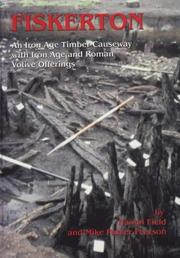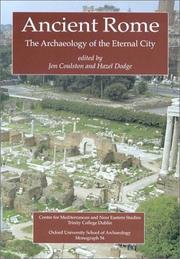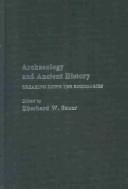| Listing 1 - 10 of 43 | << page >> |
Sort by
|
Book
ISBN: 9892606868 989260685X Year: 2014 Publisher: Coimbra University Press
Abstract | Keywords | Export | Availability | Bookmark
 Loading...
Loading...Choose an application
- Reference Manager
- EndNote
- RefWorks (Direct export to RefWorks)
O volume VII contém mais obras em Latim Medieval (hagiografias dos Portugaliae Monumenta Historica: S. Rosendo, Santa Senhorinha e S. Teotónio) e, sobretudo, livros em Latim Renascentista (a Oração de Sapiência de Belchior Beleago, um breve estudo sobre As Orações de Sapiência e a Universidade e ainda Louvores Latinos ao Colóquio dos Simples e Drogas).
Paradise. --- Classical antiquities. --- Antiquities, Classical --- Antiquities, Grecian --- Antiquities, Roman --- Archaeology, Classical --- Classical archaeology --- Roman antiquities --- Antiquities --- Archaeological museums and collections --- Art, Ancient --- Classical philology --- Future life

ISBN: 1789256496 1842170643 9781789256499 Year: 2003 Publisher: Oxford ; Oakville, CT : Oxbow Books,
Abstract | Keywords | Export | Availability | Bookmark
 Loading...
Loading...Choose an application
- Reference Manager
- EndNote
- RefWorks (Direct export to RefWorks)
Fiskerton, located in the Witham valley of Lincoln, is one of only a handful of excavated sites in Europe to reveal the Iron Age practice of ritually destroying special and elite objects by placing them in a body of water.
Classical antiquities. --- Antiquities, Classical --- Antiquities, Grecian --- Antiquities, Roman --- Archaeology, Classical --- Classical archaeology --- Roman antiquities --- Antiquities --- Archaeological museums and collections --- Art, Ancient --- Classical philology
Book
ISBN: 1474429742 1474429769 9781474429740 1474429777 9781474429764 Year: 2019 Publisher: Edinburgh : Edinburgh University Press,
Abstract | Keywords | Export | Availability | Bookmark
 Loading...
Loading...Choose an application
- Reference Manager
- EndNote
- RefWorks (Direct export to RefWorks)
12 essays by international specialists in classical antiquity create a period-specific interdisciplinary introduction to distributed cognition and the cognitive humanities. The first book in an ambitious 4-volume set looking at distributed cognition in the history of thought. This collection explores how cognition is explicitly or implicitly conceived of as distributed across brain, body and world in Greek and Roman technology, science, medicine, material culture, philosophy and literary studies. A range of models emerge, which vary both in terms of whether cognition is just embodied or involves tools or objects in the world. As many of the texts and practices discussed have influenced Western European society and culture, this collection reveals the historical foundations of our theoretical and practical attempts to comprehend the distributed nature of human cognition.
Distributed cognition --- Distributed cognition. --- Classical antiquities --- Antiquities, Classical --- Antiquities, Grecian --- Antiquities, Roman --- Archaeology, Classical --- Classical archaeology --- Roman antiquities --- Antiquities --- Archaeological museums and collections --- Art, Ancient --- Classical philology --- Cognition --- Psychological aspects. --- Civilization, Classical --- Classical civilization --- Civilization, Ancient --- Classicism --- History.

ISBN: 1782975047 1782975020 9781782975021 9781782975045 0947816542 9780947816544 0947816550 9780947816551 Year: 2000 Publisher: Oxford Oxford University School of Archaeology
Abstract | Keywords | Export | Availability | Bookmark
 Loading...
Loading...Choose an application
- Reference Manager
- EndNote
- RefWorks (Direct export to RefWorks)
A major new book on the archaeology of Rome. The chapters, by an impressive list of contributors, are written to be as up-to-date and useful as possible, detailing lots of new research. There are new maps for the topography and monuments of Rome, a huge research bibliography containing 1,700 titles and the volume is richly illustrated. Essential for all Roman scholars and students. Contents: Preface: a bird's eye view ( Peter Wiseman ); Introduction ( Jon Coulston and Hazel Dodge ); Early and Archaic Rome ( Christopher Smith ); The city of Rome in the Middle Republic ( Tim Cornell ); The moral museum: Augustus and the image of Rome ( Susan Walker ); Armed and belted men: the soldiery in Imperial Rome ( Jon Coulston ); The construction industry in Imperial Rome ( Janet Delaine and G Aldrete ); The feeding of Imperial Rome: the mechanics of the food supply system ( David Mattingly ); `Greater than the pyramids': the water supply of ancient Rome ( Hazel Dodge ); Entertaining Rome ( Kathleen Coleman ); Living and dying in the city of Rome: houses and tombs ( John Patterson ); Religions of Rome ( Simon Price ); Rome in the Late Empire ( Neil Christie ); Archaeology and innovation ( Hugh Petter ); Appendix: Sources for the study of ancient Rome ( Jon Coulston and Hazel Dodge ).
Archeologische aspecten. --- Rome -- Antiquities. --- Rome -- Civilisation. --- Rome -- Civilization. --- Rome (Italie) -- Antiquite ́s. --- Rome (Italy) -- Antiquities. --- Rome (Italy) --- Rome --- Rome (Italie) --- Antiquities. --- Civilization. --- Antiquités. --- Civilisation. --- Roman antiquities. --- Archaeology. --- Excavations (Archaeology) --- Anthropology --- Auxiliary sciences of history --- History --- Antiquities --- Archeology
Book
ISBN: 1282574930 9786612574931 1441648119 9781441648112 8479087099 9788479087098 9781282574939 6612574933 Year: 2003 Publisher: San Vicente del Raspeig Universidad de Alicante
Abstract | Keywords | Export | Availability | Bookmark
 Loading...
Loading...Choose an application
- Reference Manager
- EndNote
- RefWorks (Direct export to RefWorks)
Numismatics, Roman. --- Emperors --- Classical antiquities. --- Antiquities, Classical --- Antiquities, Grecian --- Antiquities, Roman --- Archaeology, Classical --- Classical archaeology --- Roman antiquities --- Antiquities --- Archaeological museums and collections --- Art, Ancient --- Classical philology --- Classical antiquities --- Succession
Book
ISBN: 1743052731 9781743052730 9781743052747 174305274X 9781743052358 1743052359 Year: 2013 Publisher: Kent Town, Aus
Abstract | Keywords | Export | Availability | Bookmark
 Loading...
Loading...Choose an application
- Reference Manager
- EndNote
- RefWorks (Direct export to RefWorks)
This is the story of a brilliant yet flawed man with a passionate devotion to the island of Cyprus and its archaeology. It is also the story of his wife, Eve. Devoted to his memory and herself trained as an archaeologist, she worked for nearly 50 years after his death to complete her husband's work and ensure his legacy.
Classical antiquities. --- Archaeologists --- Historians --- Antiquities, Classical --- Antiquities, Grecian --- Antiquities, Roman --- Archaeology, Classical --- Classical archaeology --- Roman antiquities --- Antiquities --- Archaeological museums and collections --- Art, Ancient --- Classical philology --- Stewart, James R. --- Stewart, Eve. --- Stewart, J. R. B. --- Stewart, J. R. --- Cyprus --- Antiquities.
Book
ISBN: 178925616X 1789256151 Year: 2021 Publisher: Havertown : Oxbow Books, Limited,
Abstract | Keywords | Export | Availability | Bookmark
 Loading...
Loading...Choose an application
- Reference Manager
- EndNote
- RefWorks (Direct export to RefWorks)
This first volume, presenting research carried out through the Exeter: A Place in Time project, provides a synthesis of the development of Exeter within its local, regional, national and international hinterlands. Exeter began life in c. AD 55 as one of the most important legionary bases within early Roman Britain, and for two brief periods in the early and late 60s AD, Exeter was a critical centre of Roman power within the new province. When the legion moved to Wales the fortress was converted into the civitas capital for the Dumnonii. Its development as a town was, however, relatively slow, reflecting the gradual pace at which the region as a whole adapted to being part of the Roman world. The only evidence we have for occupation within Exeter between the 5th and 8th centuries is for a church in what was later to become the Cathedral Close. In the late 9th century, however, Exeter became a defended burh, and this was followed by the revival of urban life. Exeter's wealth was in part derived from its central role in the south-west's tin industry, and by the late 10th century Exeter was the fifth most productive mint in England. Exeter's importance continued to grow as it became an episcopal and royal centre, and excavations within Exeter have revealed important material culture assemblages that reflect its role as an international port.
Romans. --- Classical antiquities. --- Antiquities, Classical --- Antiquities, Grecian --- Antiquities, Roman --- Archaeology, Classical --- Classical archaeology --- Roman antiquities --- Antiquities --- Archaeological museums and collections --- Art, Ancient --- Classical philology --- Ethnology --- Italic peoples --- Latini (Italic people)

ISBN: 0415302013 0415301998 9780415302012 0203683595 1280025239 0203643712 1134416199 9780203643716 9780415301992 0203669975 9780203669976 6610025231 9786610025237 9781134416196 9781280025235 9781134416141 9781134416189 1134416180 Year: 2004 Publisher: London: Routledge,
Abstract | Keywords | Export | Availability | Bookmark
 Loading...
Loading...Choose an application
- Reference Manager
- EndNote
- RefWorks (Direct export to RefWorks)
This collection of pieces from an international range of contributors explores in detail the separation of the human past into history and archaeology.
Archaeology and history --- Classical antiquities --- Mediterranean Region --- Antiquities --- Archaeology and history. --- Classical antiquities. --- Mediterranean Region - Antiquities. --- History. --- History & Archaeology --- Archaeology --- Antiquities. --- Antiquities, Classical --- Antiquities, Grecian --- Antiquities, Roman --- Archaeology, Classical --- Classical archaeology --- Roman antiquities --- Historical archaeology --- History and archaeology --- Archaeological museums and collections --- Art, Ancient --- Classical philology --- History --- Mediterranean Region - Antiquities
Book
ISBN: 9780199695843 0199695849 0191755885 019162599X 9780191755880 9780191625992 Year: 2013 Volume: *30 Publisher: London Oxford University Press
Abstract | Keywords | Export | Availability | Bookmark
 Loading...
Loading...Choose an application
- Reference Manager
- EndNote
- RefWorks (Direct export to RefWorks)
This volume provides a new perspective on the emergence of the modern study of antiquity, Altertumswissenschaft, in eighteenth-century Germany through an exploration of debates that arose over the work of the art historian Johann Joachim Winckelmann between his death in 1768 and the end of the century. Winckelmann's eloquent articulation of the cultural and aesthetic value of studying the ancient Greeks, his adumbration of a new method for studying ancient artworks, and his provision of a model of cultural-historical development in terms of a succession of period styles, influenced both the public and intra-disciplinary self-image of classics long into the twentieth century. Yet this area of Winckelmann's Nachleben has received relatively little attention compared with the proliferation of studies concerning his importance for late eighteenth-century German art and literature, for historians of sexuality, and his traditional status as a 'founder figure' within the academic disciplines of classical archaeology and the history of art. Harloe restores the figure of Winckelmann to classicists' understanding of the history of their own discipline and uses debates between important figures, such as Christian Gottlob Heyne, Friedrich August Wolf, and Johann Gottfried Herder, to cast fresh light upon the emergence of the modern paradigm of classics as Altertumswissenschaft: the multi-disciplinary, comprehensive, and historicizing study of the ancient world.
Classical antiquities --- Antiquités gréco-romaines --- Study and teaching --- History --- Historiography --- Etude et enseignement --- Histoire --- Historiographie --- Winckelmann, Johann Joachim, --- Influence. --- Historiography. --- Antiquités gréco-romaines --- Classicism --- Germany --- Intellectual life --- Pseudo-classicism --- Aesthetics --- Literature --- Civilization, Classical --- Antiquities, Classical --- Antiquities, Grecian --- Antiquities, Roman --- Archaeology, Classical --- Classical archaeology --- Roman antiquities --- Antiquities --- Archaeological museums and collections --- Art, Ancient --- Classical philology --- Winkelmann, M. --- Winckelmann, Johann Jacob --- Archaeology. --- Antiquities.
Periodical
ISSN: 22727639 00310387 Year: 1953 Publisher: Toulouse : Toulouse : Toulouse : Toulouse : Faculté des lettres Université de Toulouse-Le Mirail Presses Universitaires du Mirail Presses Universitaires du Midi
Abstract | Keywords | Export | Availability | Bookmark
 Loading...
Loading...Choose an application
- Reference Manager
- EndNote
- RefWorks (Direct export to RefWorks)
Revue interuniversitaire, internationale et quadrimestrielle, Pallas publie en français mais aussi en anglais, en espagnol, italien et allemand, des articles d'enseignants, jeunes chercheurs et doctorants. Les sujets abordés, réunis dans des dossiers thématiques traitent des sciences de l’Antiquité au sens large et intéressent tous les domaines des civilisations grecque et romaine : littérature, linguistique, métrique, histoire, archéologie, iconographie. Tous les deux ans, Pallas accueille le numéro thématique consacré à la nouvelle question d’histoire ancienne aux concours de l’enseignement du CAPES et de l’Agrégation.
Classical philology --- Classical antiquities --- Classical antiquities. --- Classical philology. --- Philology, Classical --- Antiquities, Classical --- Antiquities, Grecian --- Antiquities, Roman --- Archaeology, Classical --- Classical archaeology --- Roman antiquities --- Greek language --- Greek literature --- Greek philology --- Humanism --- Latin language --- Latin literature --- Latin philology --- Antiquities --- Archaeological museums and collections --- Art, Ancient --- Philologie ancienne --- Antiquités gréco-romaines
| Listing 1 - 10 of 43 | << page >> |
Sort by
|

 Search
Search Feedback
Feedback About UniCat
About UniCat  Help
Help News
News